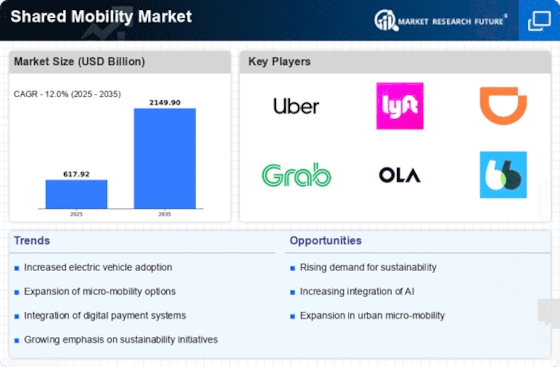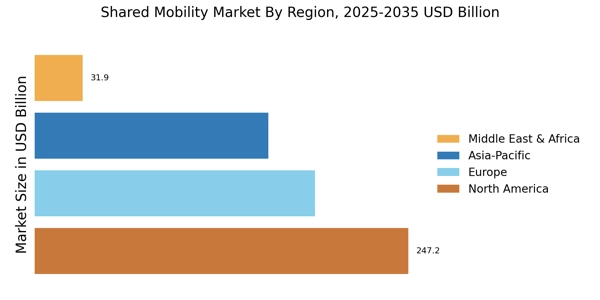Urbanization Trends
Rapid urbanization is a significant driver influencing the Global Shared Mobility Market. As more individuals migrate to urban centers, the demand for efficient transportation solutions escalates. Data indicates that by 2030, nearly 60% of the world's population will reside in urban areas, intensifying the need for shared mobility options. This trend is prompting cities to invest in infrastructure that supports shared mobility services, such as dedicated lanes and parking facilities. Consequently, the Shared Mobility Services Segment is poised for growth as urban planners and policymakers recognize the necessity of integrating shared mobility into their transportation frameworks.
Sustainability Initiatives
The increasing emphasis on sustainability appears to be a pivotal driver in the Shared Mobility Industry. As urban areas grapple with pollution and traffic congestion, shared mobility solutions, particularly electric vehicles, are gaining traction. According to recent data, the adoption of electric shared mobility solutions is projected to grow by over 30% in the next five years. This shift not only aligns with environmental goals but also appeals to consumers who prioritize eco-friendly options. Consequently, companies in the Shared Mobility Services Segment are investing in electric fleets and sustainable practices, which may enhance their market position and attract environmentally conscious users.
Technological Advancements
Technological innovations are transforming the Shared Mobility Landscape, facilitating enhanced user experiences and operational efficiencies. The integration of advanced technologies such as artificial intelligence, machine learning, and real-time data analytics is reshaping how services are delivered. For instance, predictive analytics can optimize fleet management, reducing operational costs by up to 20%. Furthermore, mobile applications are streamlining the user experience, making it easier for consumers to access shared mobility services. As technology continues to evolve, it is likely that the Mobility Sharing Market will witness further enhancements, potentially leading to increased adoption rates and user satisfaction.
Changing Consumer Preferences
Shifting consumer preferences are reshaping the landscape of the Shared Mobility Sector. Younger generations, particularly millennials and Gen Z, are increasingly favoring access over ownership, leading to a surge in demand for shared mobility solutions. Research suggests that approximately 70% of these demographics prefer using shared services rather than owning a vehicle. This shift is prompting companies to adapt their offerings to meet the evolving needs of consumers, such as providing flexible pricing models and diverse vehicle options. As these preferences continue to evolve, the Mobility Sharing Market is likely to experience significant transformations.
Government Policies and Incentives
Government policies and incentives play a crucial role in shaping the Shared Mobility Industry. Many governments are implementing regulations and providing financial incentives to promote shared mobility solutions as part of broader sustainability initiatives. For example, tax breaks for electric vehicle usage and subsidies for shared mobility services are becoming increasingly common. These measures not only encourage the adoption of shared mobility but also support the development of necessary infrastructure. As governments continue to prioritize sustainable transportation, the Mobility Sharing Market is expected to benefit from favorable policies that stimulate growth and innovation.

















